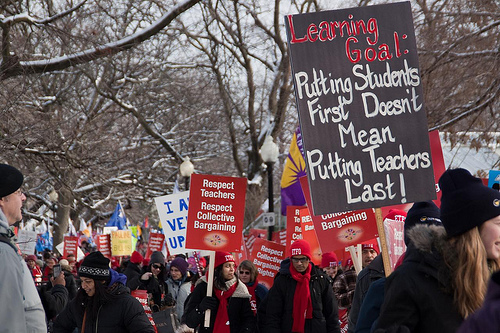Change the conversation, support rabble.ca today.
Demonstrating her political smarts from the get-go, Kathleen Wynne has lost no time in reaching out to Ontario’s rebellious teachers. As she well understood, she was not the only victor when Ontario Liberals selected their new leader. The other clear winner was the province’s public elementary and secondary teachers. By turning out at the Liberal convention to protest in the tens of thousands, and by being joined by many thousands more of their supporters, the teachers powerfully demonstrated their political muscle.
Whenever the next election falls, Ontario’s teachers have made their intentions unmistakable. They’re prepared to campaign, and campaign hard, against politicians who treat teachers as little more than a political tool for their own opportunistic purposes.
Maybe that by-election for the NDP last September in Kitchener-Waterloo was no fluke. Besides spelling Dalton McGuinty’s own personal Waterloo, it demonstrated the potential fate of a party or government that blatantly exploits anti-teacher sentiments. Teachers will rally in huge numbers to play an active, maybe decisive, role in the next election. Teachers and the other public sector workers whom the McGuinty government deliberately demonized may very well determine our next government. But it’s by no means inevitable it will be the government they prefer.
Attention must be paid, reads one of the great lines in literature, and Premier Wynne’s assiduous attention to the teachers and their union leaders may well, against all odds, still pay off. Preposterous as it seems, she just may seduce back to the Liberal fold the teachers whom the government she was part of methodically wooed and then coolly ditched.
That the teachers’ unions were far from being totally alienated from the Ontario Liberals, as most assumed, was rather shockingly demonstrated by the news that they had actually contributed to the war chests of no fewer than four of the leadership contenders, including Ms. Wynne herself. Yet were three of them not members of the cabinet whose anti-teacher legislation led to the present bitter impasse? Did any of the lucky recipients resign in protest? Which makes these donations to their campaigns as cynical a bit of politicking as anything Dalton McGuinty ever tried.
In any event, Ontario teachers are at a crossroads. Two of the three parties are vying for their support while the third can’t resist reminding them of the ghastly fate of teachers during the fabled days of Mike Harris. And teachers indeed have it in their power to deliver a new far right regime to Ontario in two ways. They can split the vote between the Liberals and NDP and allow the Hudak Tea Party to form a government with well under 40 per cent of the vote — the very same scenario that has bestowed Stephen Harper on Canada. And they can also continue to squander their moral influence by refusing to restore students’ extra-curricular activities.
Teachers surely grasp how easy it’s been to turn private sector workers against their relatively privileged public sector brothers and sisters, who have largely succeeded in achieving the middle class life that most Canadians once aspired to. Having fallen behind in globalization’s race to the bottom, private sector workers have been manipulated into turning their resentment against their luckier comrades instead of mobilizing to regain decent wages and benefits for themselves. Failing to take into account this sad reflection of human nature would be a major error for public sector workers.
The second trap for teachers has already been set. Normally when workers work to rule — doing exactly what their contracts say and not one iota more — they do so for strategic reasons. They believe they can influence negotiations by putting unbearable pressure on their employers. That this can be inconvenient for the innocent and vulnerable is undeniable. In every postal strike, those who’d never before given a tinker’s dam for poor senior citizens can be counted on to denounce the inhumanity of denying them their pension checks. Despite the crocodile tears, this is indeed a serious moral dilemma, legitimized only by the prospect of real and quick success for the striking unions.
Teachers, at least to the naked eye, have no such justification for their grievances or for punishing students for the sins of the government. Months ago, it may have seemed justifiable. But no legitimate rationale now exists for denying students their extracurricular activities. If teachers wanted to prove their internal solidarity, they’ve done so. If they wanted to show what lies ahead for a government that uses them as political fodder, they’ve done so. So what ethical or practical reasons exist for continuing to victimize their students?
Teachers must decide: Do they or do they not want to facilitate Tim Hudak’s crude but potentially devastating strategy of running against public sector workers? Are they prepared to again trust a government that sorely betrayed them? Teachers have the opportunity to win back public confidence by taking the high road, giving them far more political leverage, beginning right now. There is nothing further to wait for. While quietly organizing for the next election, they should immediately resume all the school duties the public rightly expects from them. The choice remains theirs, but it won’t be for long.
This article was first published in the Globe and Mail.
Photo: LexnGer/Flickr




